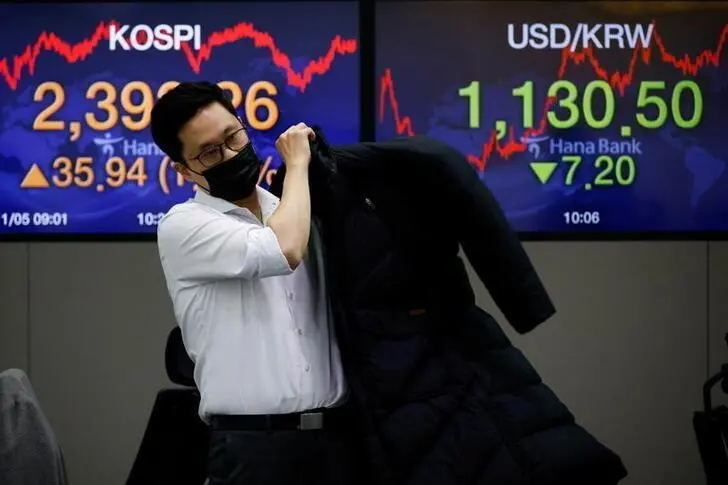PHOTO
LONDON - Global share markets rose to their highest in over a year and a half and borrowing costs and the dollar tumbled on Thursday, as signals from the world's most influential central bank that rate cuts are coming triggered euphoria.
A easy-sounding U.S. Federal Reserve had got the rally racing on Wednesday and in-tune Swiss central bank was enough to ensure European stocks stayed at near two-year highs when Norway announced a surprise hike and the Bank of England stuck to the script of keeping UK rates high.
Attention was about to turn the European Central Bank's 1315 GMT rate decision and its press conference afterwards where investors have also been rapidly dragging forward rate cut bets.
MSCI's 47-country world stocks index was adding to its stellar 13% gain over the last 1-1/2 months, while bond market borrowing costs were still in a tailspin, with German bund and U.S. Treasury yields at nine- and four-month lows respectively.
It was primarily in the reaction to the Fed on Wednesday where Jerome Powell had said its historic tightening of monetary policy was likely to be over now with inflation falling faster than expected.
A near-unanimous 17 of its 19 policymakers had projected the Fed funds rates would be lower in a year's time - with the median forecast showing a three-quarters of a percentage point drop from the current 5.25%-5.50% range.
That provided a surprise and left markets betting that cuts could start as soon as March and might end up being double the amount as the Fed's rate-setters currently expect.
"The big question for today is how much central banks hunt in packs," State Street Global Markets' head of macro strategy Michael Metcalfe said, referring to the upcoming BOE and ECB rate decisions.
"The assumption is, that if the Fed didn't push back no one will and everyone will pivot together".
"Interest rate markets have moved a lot ... and given what the Fed has said markets will see that as a vindication of those moves."
The central banks weren't the only things Europe's traders were watching, however.
Hungarian Prime Minister Viktor Orban was digging his heels in at a high-stakes summit in Brussels, saying that Ukraine did not fulfil the criteria to start accession talks with the EU.
Orban is blocking both the start of EU membership talks and 50 billion euros ($54 billion) in financial aid for Kyiv.
The summit comes at a crucial time in Ukraine's war against Russia's invasion after a counter-offensive failed to make major gains and with the Biden administration in the United States so far unable to get a $60 billion aid package through Congress.
"There is no reason to negotiate membership of Ukraine now," Orban said as he arrived at the Brussels summit. "Pre-conditions were not met. We have to come back to it later on," he said, pointing at European Parliament elections next June.
NO RESCUE
The UK's FTSE 100 gave up a sliver of its gains after the BoE stuck to its guns that its interest rates would remain high for an "extended period".
Currency dealers lifted the pound 0.7% as well as they shrugged off recent data showing a slowdown in UK wage growth and a 0.3% fall in October GDP figures.
The BoE's Monetary Policy Committee voted 6-3 to keep rates at a 15-year high of 5.25%, in line with economists' expectations in a Reuters pre-meeting poll.
"The Bank of England isn't riding to the rescue of a flatlining economy," Vivek Paul, UK Chief Investment Strategist of BlackRock's 'Investment Institute'.
In Asia overnight, the focus had all been on the Fed's signals which had also prompted a sharp rally on Wall Street.
MSCI's broadest index of Asia-Pacific shares outside Japan shot up 1.8%, its biggest one-day percentage jump in a month although China had stumbled again and a stronger yen pushed Toyko down 0.7%.
The Fed's pivot "is a definitely a good surprise for assets," Close Brothers Asset Management's Chief Investment Officer Robert Alster said, describing it as "unadulterated good news and an early Christmas present for all", albeit one that heaps pressure on the BOE and ECB later.
U.S. stock futures were pointing to a more modest 0.2% rise for the S&P 500 later, as the 10-year Treasury yield pushed as low as 3.9845%, breaking below the psychological 4% mark.
The U.S. dollar index, which measures the greenback against a basket of currencies, fell a further 0.3% to 102.53, leaving it at $1.09 to the euro and down nearly 1% versus the yen at 141.82 yen.
Spot gold was up 0.23% at $2,030.99 per ounce, after rising 2.4% on Wednesday. Oil extended its gains too with Brent up $1.5, or 2%, to $75.80 a barrel and U.S. West Texas Intermediate (WTI) up at $70.95.
(Reporting by Marc Jones, Editing by Alexandra Hudson and David Evans)




















